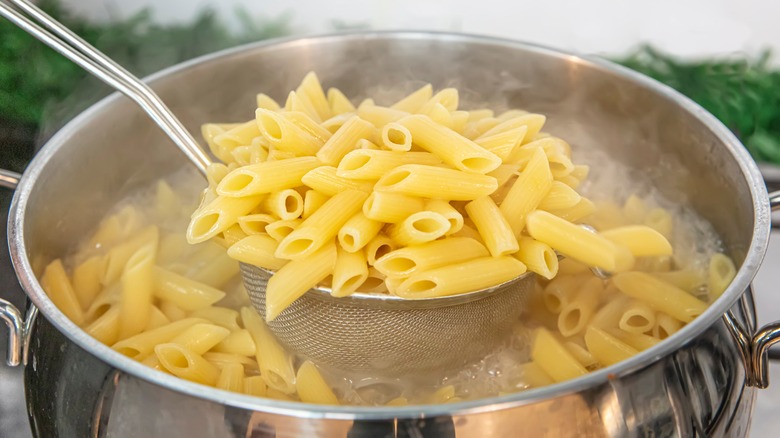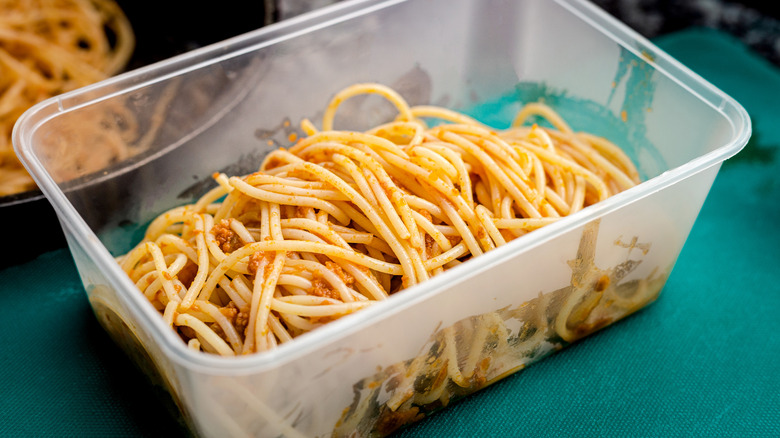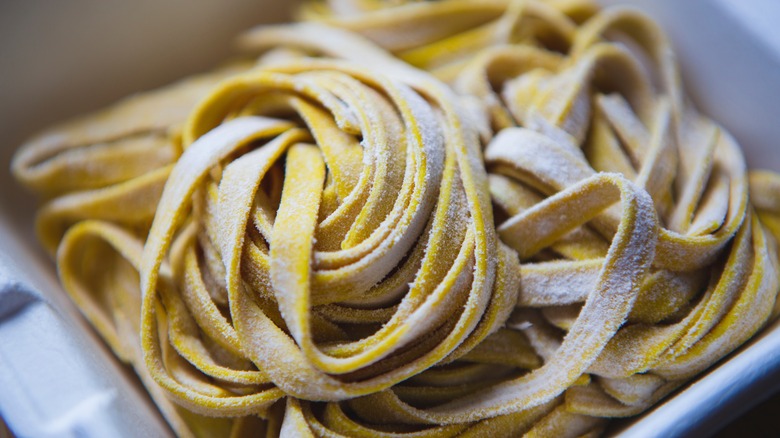How Long Does Cooked Pasta Really Last In The Fridge?
If you overestimate how much pasta you need to cook for dinner, it's easy to package up the leftovers for another meal. But if you find a forgotten container of noodles hidden at the back of the fridge, you may want to reconsider heating and eating it. Generally speaking, cooked pasta will only last about three to five days in the fridge, and this timeframe only applies if you store it properly.
To keep the pasta as fresh as possible, keep it in an airtight container or a resealable plastic bag. An airtight seal will prevent any smells from nearby foods from seeping into the pasta, preserving its neutral flavor. Additionally, the noodles should only be stored after they're completely cooled down. Any added heat trapped in the container could cause condensation to form, adding excess moisture and a gummy texture to the leftovers.
So long as the pasta is still fresh, there are a few ways to heat it up and enjoy it again. The quickest method is to simply heat it in small intervals in the microwave. If you have the time to boil water, though, the pasta can be reheated in the same way it was cooked in the first place. The noodles can be dunked in the hot water for about a minute, and they'll rehydrate as they reheat for a fresher texture.
Spoiled pasta looks and smells different
It's a good idea to store pasta and sauce separately. Storing them together makes the pasta soak up excess moisture from the sauce, which could create an unpleasant texture — though if you don't mind soggy noodles, the added flavor might be seen as an advantage. An open jar of spaghetti sauce will last in the fridge for five to 14 days, depending on the ingredients, so make sure both your leftover sauce and noodles are fresh before enjoying them.
There are a few visual indicators to check for when examining your pasta, in order to make sure it's safe to eat. Firstly, pasta will start to change color as it gets older. A darker shade or textured mold spots are an obvious sign that it's gone bad. Even before it begins to mold, the noodles might start to look slimy. Even more subtle changes — like white or gray hues — can also be a sign that the pasta is starting to spoil.
Bacteria growth can also cause pasta to take on a foul smell. If your leftover spaghetti stinks, it could definitely make you sick. Eating expired or moldy pasta could cause quite a few digestive issues, so if you suspect that your leftovers are past their prime, it's probably best to just toss the whole thing in the trash.
How to freeze cooked pasta
If you want to extend the lifespan of your pasta beyond just a few days, you might consider freezing it. Once the pasta is in an airtight container or freezer bag, it can be mixed with a little bit of neutral-flavored oil and then frozen. The oil can prevent the noodles from sticking together as they freeze. Once frozen, pasta should be defrosted and eaten within two months for optimal quality.
Prior to freezing, you can also pre-portion out the pasta into individual serving sizes to make for easier defrosting later on. Simply scoop about a half cup of cooked pasta into freezer bags, press the air out, and place them in the freezer. Pressing the bags flat allows you to stack them and save space, but an airtight container can also be used. Then, when you're ready to enjoy a quick meal, just heat up one portion at a time. You can also freeze spaghetti sauce in ice cube molds to defrost the perfect amount of sauce to mix with the pasta. Just like that, you have an easy pasta dinner waiting in your freezer.



